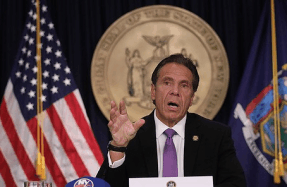Humorless

Was Michelle Wolf funny? Half of America, or at least those who watched the White House Correspondents Association dinner on C-Span, apparently found her shtick hilarious. Her Twitter followers doubled overnight. The other half of the TV-viewing public, particularly those watching President Trump in another Washington (a township in Michigan), were offended. Wolf’s “take no prisoners” (particularly Republican prisoners) routine only reinforced what the president told the faithful at his competing rally on Saturday night. “These people,” he said of the 1,000-plus journalists who would gather in the Hilton ballroom half a country away (or by implication, all journalists), “they hate you.”
But whether one found the 32-year old comedienne’s routine “earthy,” as the New York Times called it, or vulgar; searing or insufferable; edgy or outrageous, the furor over her performance overshadowed what was supposed to be a celebration of the nation’s free press and the First Amendment. All but forgotten in the Wolf flap is the staggering danger journalists face covering the news each day in many parts of the world. According to the Committee to Protect Journalists, 81 reporters were killed while reporting last year; more than 250 were jailed for offending those they cover. And as members and guest of the White House Correspondents Association sipped champagne and traded feuding tweets over Wolf’s performance, ten journalists died in suicide-bombing attacks in Afghanistan—including a BBC reporter and two Radio Free Europe/Radio Liberty journalists. The Islamic State took credit for the attacks in Kabul and Khost province, in which over 25 people died and more than 100 were wounded. It was the worst one-day toll ever among journalists in that country.
In fact, most of the WHCA dinner was devoted to presenting awards for journalism—the reporting that President Trump has denigrated as “fake news.” But the dinner’s buzz was all about Wolf’s often-savage attacks not only on him, his staff, and the do-nothing Congress, but also on journalists themselves, many of whom “love” President Trump, she asserted—or should. “What no one in this room wants to admit,” she said, “is that Trump has helped all of you. He couldn’t sell steaks or vodka or water or college or ties or Eric, but he has helped you. He’s helped you sell your papers and your books and your TV. You helped create this monster, and now you’re profiting off of him.”
The president himself lost no time in assailing both Wolf’s performance and the media’s. In a tweet, Trump took a victory gloat over the criticism of the roast from some of his most ardent media critics. In defending his no-show at the dinner for the second consecutive year, Trump tweeted that while last year’s dinner was a “failure,” this year’s gathering was even worse—“an embarrassment to everyone associated with it.” It’s hard to argue with that judgment.
Stung by the criticism, much of it from Trump’s liberal critics, Margaret Talev, president of the WHCA, beat an embarrassing retreat. In a semi-apology, Talev said that Wolf’s monologue was “not in the spirit” of the group’s largely forgotten mission—“to offer a unifying message about our common commitment to a vigorous and free press.”
Trump, however, only rarely pretends to share that commitment. While Michelle Wolf offended people and sparked outrage by comparing Sarah Huckabee Sanders to The Handmaid’s Tale’s sadistic Aunt Lydia, and by mocking her looks and makeup, Trump has not been shy about mocking female critics’ appearance. “Look at that face! Would anyone vote for that?” candidate Trump famously said of then-rival Carly Fiorina, one of many such attacks on women. In his speeches and tweets, Trump has relished attacking his critics and rivals, male or female, athletic or handicapped, Republican or Democrat, on a personal, visceral level.
Wolf’s excessive vulgarity may have confirmed the perception that reporters hate Donald Trump, but the standards to which each is held should differ. She is a comic; he is president. That, too, has been lost in the fire and fury over her rant.






